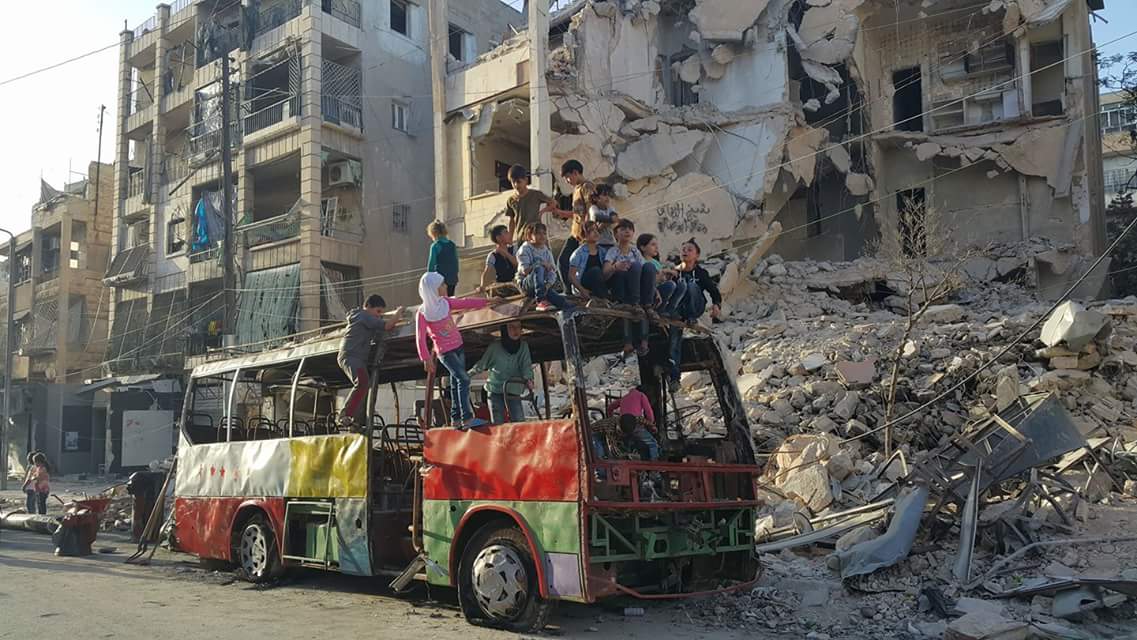The heavy bombardment of Aleppo by Russian and Syrian warplanes are "part of a deliberate military strategy to empty the city of its inhabitants and seize control," Amnesty said.
In just one week, 90 locations were damaged or destroyed in an area roughly the size of Manhattan, according to the satellite imagery.
"The scale of the bloodshed and destruction wrought on eastern Aleppo city over the past month is harrowing," said Lynn Maalouf, deputy director of research at Amnesty's Beirut office.
"Syrian government forces, with the support of Russia, have launched relentless attacks that have flagrantly disregarded fundamental rules of international humanitarian law."
Amnesty reviewed photographs showing remnants of cluster bombs and submunitions dropped in Aleppo neighborhoods over the past three weeks and said weapons experts have identified these as Russian-made.
- Driving out civilians -
Maalouf said the apparent use of cluster bombs in east Aleppo was "further evidence of how determined Syrian government forces and their Russian allies are to create a hostile and deadly environment in the city, clearly aimed at driving civilians out at any cost."
The satellite photos showed large craters in heavily built-up areas that were identified as destroyed buildings in east Aleppo, which has been under heavy bombing since the Syrian offensive to retake the area began on September 22.
Amnesty quoted the Syrian American Medical Society as saying that 14 medical facilities have been hit by air strikes in the nearly month-long offensive.
Doctors are struggling to treat a large number of casualties from the bombing. At one point, 800 wounded patients were recorded in one week.
Amnesty recalled that the deliberate targeting of hospitals and other buildings used by civilians amount to war crimes.
The release of the photographs was timed to coincide with a special session in the General Assembly on Thursday that was called to press demands for peace efforts in Syria after the Security Council failed to take action.
Two resolutions demanding a halt to the violence were defeated at the Security Council during a stormy session this month, with Russia vetoing a measure calling for an end to the air attacks.
Led by Canada, 70 countries in the 193-member assembly have called for the session that diplomats have said could lay the groundwork for tougher action, possibly targeting Syria's voting rights at the United Nations.
-----------------------------------------------------------------------------------------------------------------
In just one week, 90 locations were damaged or destroyed in an area roughly the size of Manhattan, according to the satellite imagery.
"The scale of the bloodshed and destruction wrought on eastern Aleppo city over the past month is harrowing," said Lynn Maalouf, deputy director of research at Amnesty's Beirut office.
"Syrian government forces, with the support of Russia, have launched relentless attacks that have flagrantly disregarded fundamental rules of international humanitarian law."
Amnesty reviewed photographs showing remnants of cluster bombs and submunitions dropped in Aleppo neighborhoods over the past three weeks and said weapons experts have identified these as Russian-made.
- Driving out civilians -
Maalouf said the apparent use of cluster bombs in east Aleppo was "further evidence of how determined Syrian government forces and their Russian allies are to create a hostile and deadly environment in the city, clearly aimed at driving civilians out at any cost."
The satellite photos showed large craters in heavily built-up areas that were identified as destroyed buildings in east Aleppo, which has been under heavy bombing since the Syrian offensive to retake the area began on September 22.
Amnesty quoted the Syrian American Medical Society as saying that 14 medical facilities have been hit by air strikes in the nearly month-long offensive.
Doctors are struggling to treat a large number of casualties from the bombing. At one point, 800 wounded patients were recorded in one week.
Amnesty recalled that the deliberate targeting of hospitals and other buildings used by civilians amount to war crimes.
The release of the photographs was timed to coincide with a special session in the General Assembly on Thursday that was called to press demands for peace efforts in Syria after the Security Council failed to take action.
Two resolutions demanding a halt to the violence were defeated at the Security Council during a stormy session this month, with Russia vetoing a measure calling for an end to the air attacks.
Led by Canada, 70 countries in the 193-member assembly have called for the session that diplomats have said could lay the groundwork for tougher action, possibly targeting Syria's voting rights at the United Nations.
-----------------------------------------------------------------------------------------------------------------









 Home
Home Politics
Politics











